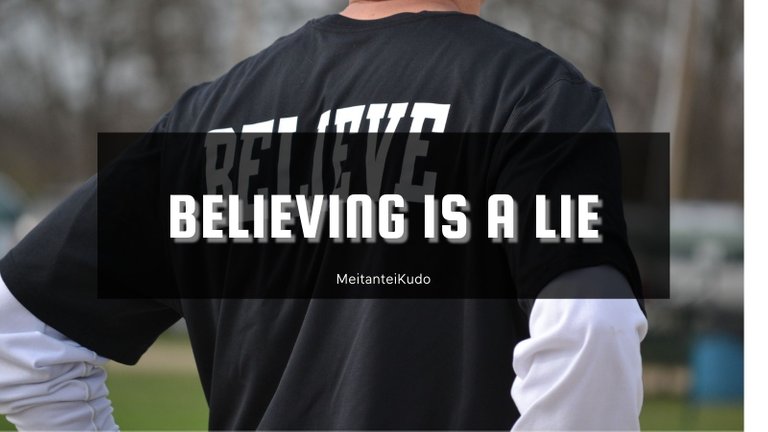Believing is a Lie

In a way, we can say that what we are is composed of the things that we believe in and the things that we know. But what if the very thing we believe to be true is the one thing that is holding us back to know the simple and irrefutable truth?
When do we believe something? When it's taught to us? When we see it? When we research it? When? What does it take for us to believe something? Do we require a lot of convincing? Do we need to see data, information, or evidence before we truly believe in a piece concept? Or do we readily accept whatever is proposed to us even if it's from word of mouth?
Beliefs
A belief can be defined as the acceptance of our minds in the truth or actuality of an idea or a concept. Since our brains still work in mysterious ways, we could not say in total accuracy and particularity how our beliefs work.
We can only assume that our beliefs are formed through experience or through learning from a source that we trust or has an accepted authority over us.
For a concrete example of the first way how beliefs are formed, I can relay to you my belief that human blood tastes somewhat metallic. How did I form this belief? It's simple, I have tasted blood before. My belief was not formed because I have learned that our blood contains a significant amount of iron but this specific belief was formed because I experienced tasting blood before.
It's a peculiar story though. When we were young we were taught that we just have some limited supply of blood in our body, and when you get wounded and you bleed, that supply will be depleted, so as much as possible you have to suck on that injured part, let's say your thumb and bring all that blood droplets back inside your body.
And that was an example of a belief that was formed with the second concept. A trusted source told me that, and my elders, and I readily accepted that as the truth even though I have some skepticism in my mind. They are old, they should know what's right and wrong, right?
Confirmation Bias
As we grow older there will be a lot more things to learn, to know, and in the end to believe in. But since we are not empty shells and our minds are not in a blank state, we will have some preconceptions about the things that we are seeing, we are reading about, and that we are learning.
These pre-existing conditions will allow us or will prevent us from readily accepting the new learnings and the new things we are encountering.
There is this concept in psychology called confirmation bias. This concept states that people tend to look for information to support rather than to reject one's preconceptions about something. It's typically displayed by interpreting evidence that offers confirmation to what they already believe while rejecting or ignoring the data or information that contradicts their belief.
This behavior was pretty evident and was really observable in the show Behind the Curve in which they documented some events and some people involved in the flat Earth society.
They have some interesting footages that show confirmation bias among the members of the society.
There was this scene where a couple of their "leaders" went to a space exhibit by NASA. They came in with the mindset that everything they will see is mostly fabrications. They also came in with the agenda to point out the wrong things in there that will support their theory.
When they got inside, they spotted a machine that is somewhat like what you would find in an arcade. You'll sit on the machine and there's a monitor above you that will let you see outer space as if you were sitting on a spaceship or something.
The monitor displayed was asking the user to press the button to start the display, the member from the society repeatedly pressed on the screen and laughed at how NASA displays are broken and that they are reduced to old displays. When the member got up and moved on to another display, the camera zooms in on a big green button right on the side of the seat with a sign that reads "START".
And that shows me how blinded they are to some details in their search for their truths.
Another interesting scene was at the end of the film when the society conducted an experiment that will in a way confirm or contradict their theory. In summary, the experiment yielded results contradictory to what they believe and in support of the other theory that the Earth has curves. But what did they say? How did they interpret the results?
They did not view the results as evidence of a round Earth, instead, they claim that it was more complicated than that. And then the credits rolled out.
Did you get that? They saw the results from their own experiment but they could not still accept that they might be believing something that was a fallacy all along.